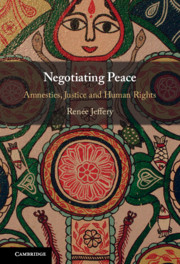1 - Amnesties and Peace Agreements
The Asia-Pacific in Global Comparative Perspective, 1980–2015
Published online by Cambridge University Press: 04 March 2021
Summary
Drawing on a new peace agreements dataset, this chapter maps general trends in the use of amnesties in peace agreements from 1980 to 2015 and situates Asian peacemaking practice within them. Focusing on a range of conflict-related, economic and political variables, as well as the engagement of the United Nations (UN) in peace negotiations, it provides a set of preliminary explanations for the continued persistence of amnesties in Asian peace processes. The chapter highlights the existence of an unusually strong relationship between separatist conflict and the rejection of the UN’s anti-amnesty policy in Asia, demonstrates that, in contrast to the global sample, Asian democracies are no more or less likely to allow amnesties for human rights violations than authoritarian regimes, and shows that the relative lack of engagement by the UN in Asian peace negotiations is a significant factor in the continued use of amnesties for human rights violations in the region.
Keywords
- Type
- Chapter
- Information
- Negotiating PeaceAmnesties, Justice and Human Rights, pp. 35 - 71Publisher: Cambridge University PressPrint publication year: 2021

